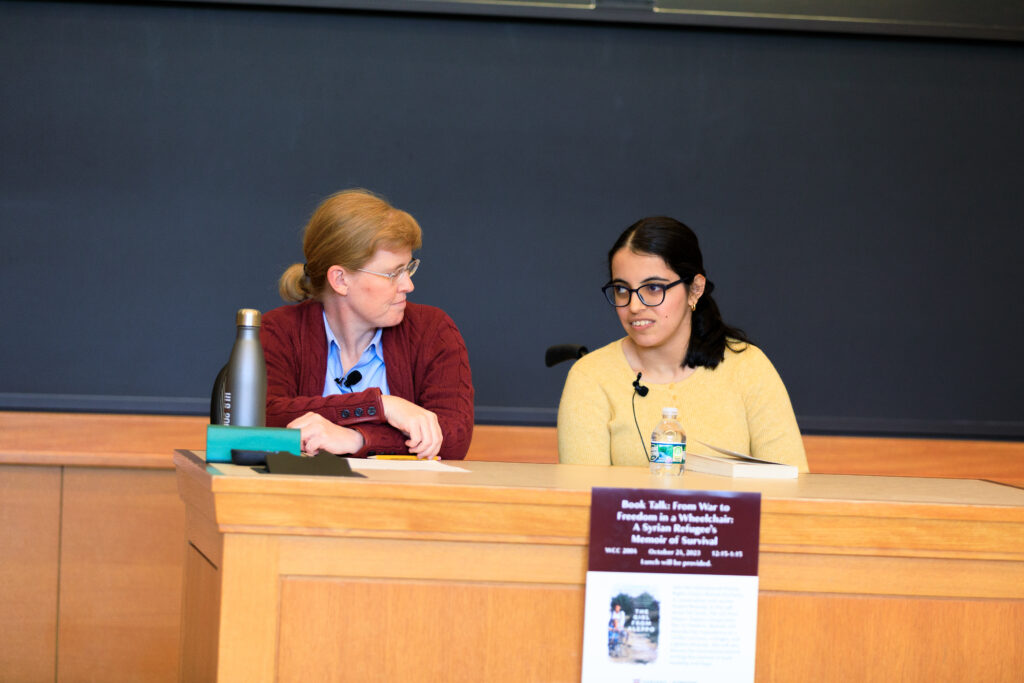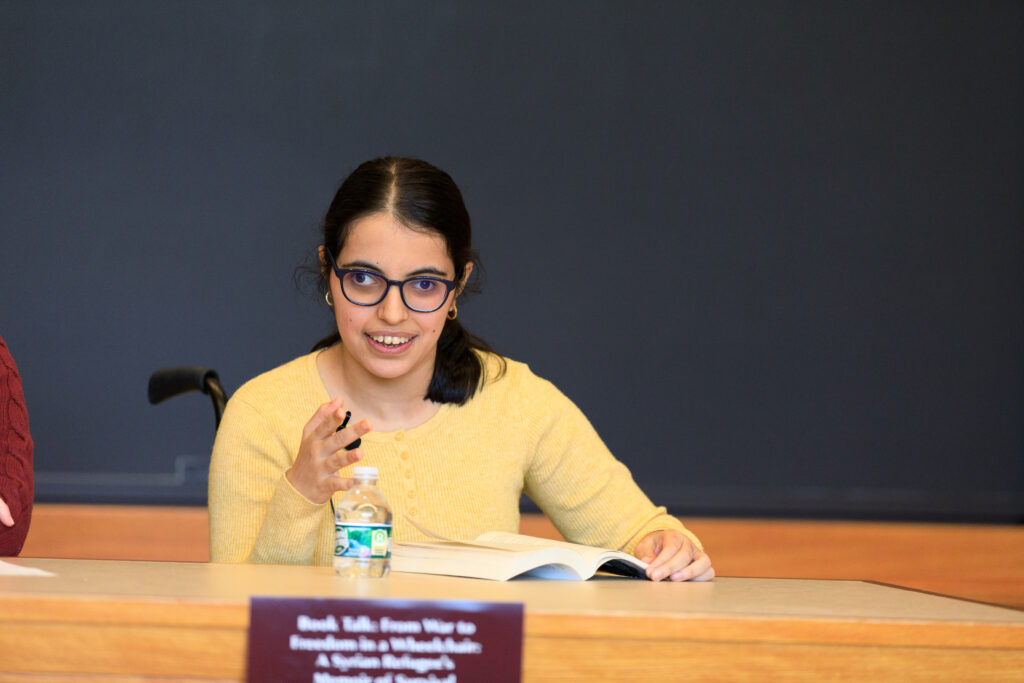A year ago this past week, on November 18, 2022, Syrian survivor and refugee Nujeen Mustafa spoke to delegates at the signing ceremony of the Political Declaration on Strengthening the Protection of Civilians from the Humanitarian Consequences arising from the Use of Explosive Weapons in Populated Areas. Signed by 83 countries, this groundbreaking declaration aims to better protect civilians from the bombing and shelling of cities and towns. Last month, Nujeen told her story at Harvard Law School.

Nujeen Mustafa was sixteen years old when she fled Syria. She traveled an arduous 3,500 miles in a wheelchair, being pushed, pulled, and carried by her sister along the way. Nujeen’s journey, while emblematic of the hardship many Syrian refugees faced, was also uniquely shaped by her multifaceted identity as a Kurdish woman with cerebral palsy.
Despite the challenges she confronted, Nujeen managed to remain optimistic throughout her journey. Whether it was showing a small glimmer of excitement for traveling by plane for the first time or expressing gratitude for her sister’s big muscles that got her halfway across the globe, Nujeen did not allow the war to strip away her humanity. Time and time again, Nujeen remained hopeful and curious about what the next chapter in her life would hold. At some point, after encounters with the media at countries’ borders, and a suggestion from one reporter, Nujeen began toying with the idea of writing a memoir about her escape from Syria.
In 2017, Nujeen published The Girl from Aleppo: Nujeen’s Escape from War to Freedom. The book is a memoir about Nujeen’s life and her journey fleeing Syria. While it captures the suffering of armed conflict, it is also full of hope, humor, and individuality, and it effectively emphasizes Nujeen’s personhood beyond the war. On October 24, 2023, Nujeen spoke about her memoir at Harvard Law School. Co-sponsored by the International Human Rights Clinic, the Armed Conflict and Civilian Protection Initiative, and the Program on Law and Society in the Muslim World, Nujeen’s book talk humanized the war in Syria and highlighted the importance of viewing human rights through an intersectional lens.
Although Nujeen did not always plan to author a book, she has always enjoyed reading. Despite never attending school, Nujeen read many books growing up and absorbed what she read with great ease, collecting hundreds of fun facts along the way. At any instant, she could recall Queen Elizabeth’s coronation date, or the fact that giraffes don’t have vocal cords. Her brother would say that she’d only need to hear something once to remember it exactly as it was. She often watched American soap operas, too. She learned to speak English that way.
Nujeen’s joys, whether watching soap operas or enjoying the gentle breeze outside, were soon overshadowed by the incessant sounds of war. During those times, Nujeen would crank up the volume on the TV in an attempt to drown out the buzzing of helicopters overhead and the booming echoes of bombs dropping in her neighborhood. But Nujeen’s efforts were fruitless and the war continued to rage. Soon, the bombardment became too much to bear and Nujeen’s family began to consider leaving Aleppo. With a half grin, Nujeen recalled her brother referring to their family as the “Walking Dead”—pale, scared, and filled with worry as they endured the war. Nujeen told her captivated audience at Harvard Law School that her family finally realized, “[i]f we wanted a life, we had to leave Syria.”

Nujeen and her family escaped Aleppo in 2015. Their trek took them through eight different country’s borders, until one and a half years later, they arrived in Germany. The journey was onerous. In Turkey, for example, Nujeen found that her identity as a Kurd made it difficult to assimilate, and that her disability made her feel even more excluded than before.
Their journey from Turkey to Greece was also particularly challenging. On a boat with 38 others, Nujeen was one of eleven minors who had to endure the dangers of traveling by sea, a journey that would prove to be fatal for some. Not long after her arrival, Nujeen came face to face with the heart-breaking image of little Aylan Kurdi— a two-year-old Kurdish Syrian boy— who had washed up onto the shores of Turkey during his own escape from Syria on the same day Nujeen and her family had arrived in Greece. Nujeen recalled seeing that image and thinking, “That could have been us.”
A few years after fleeing Syria, Nujeen published The Girl from Aleppo: Nujeen’s Escape from War to Freedom in the hopes of having others all over the world read her story and come to understand that refugees are humans, not numbers. She stated that her aim in writing the memoir was to shift people’s outlook on the different aspects of her identity, and to break stigmas around what others generally end up fearing about the “unknown.” The memoir provides a glimpse into who Nujeen is, what she and her family had, and what they lost as a result of the war in Syria.
Nujeen is now an advocate for disability rights and human rights. Not only is she humorous, poignant, resilient, and optimistic, but she is also, undoubtedly, more than just a statistic. Since writing her book, Nujeen has spoken at the United Nations Security Council, and she has played an important role in advancing the campaign for the 2022 Political Declaration on Strengthening the Protection of Civilians from the Humanitarian Consequences arising from the Use of Explosive Weapons in Populated Areas. In discussing how she navigates these spaces, Nujeen pointed out that she has enjoyed taking on such roles and reminding state officials what their job is, and whom they should be protecting.
When asked how and why she decided to become an advocate, Nujeen explained that someone had to do it—someone had to speak up for other refugees, for other people with disabilities, and for other Syrians. She graciously assumed that responsibility and used her experiences to amplify the voices of the many who might have otherwise been viewed as mere statistics. Nujeen says that she draws her strength from the people who were not able to escape, and the many others with whom she shares bits and pieces of her identity.
Nujeen believes that living in Germany now feels like “real life.” Although she sometimes closes her eyes and thinks of all that she’s left behind, she spends her time enjoying the luxuries of complaining about the mundane experiences of everyday life, like faulty wifi or upcoming exam dates, rather than bombs and helicopters. But even Nujeen’s happiest moments are often riddled with guilt, as she is reminded of all her loved ones who are still in Syria.
Regardless of when or where she has been, Nujeen has remained strong and hopeful, and she continues to advocate and share her story with others all over the world. She believes that no state is everlasting and nothing lasts forever, and that when the fog clears one day, her efforts to change even one individual’s life would have made it all worth it.